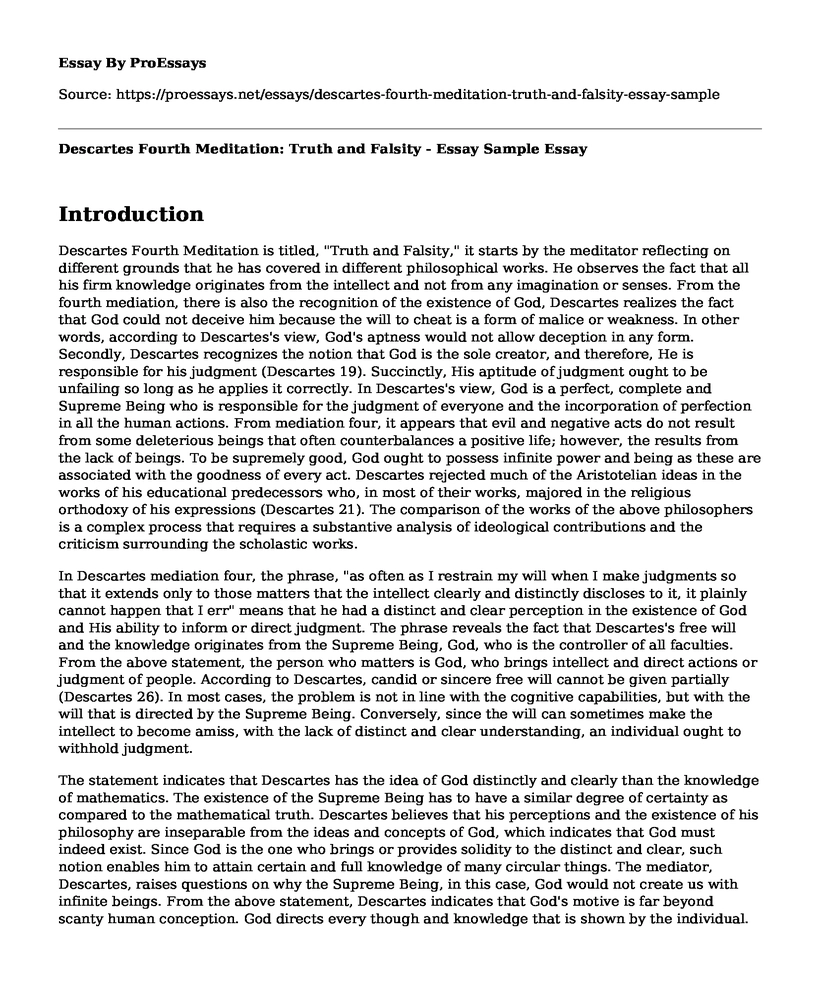Introduction
Descartes Fourth Meditation is titled, "Truth and Falsity," it starts by the meditator reflecting on different grounds that he has covered in different philosophical works. He observes the fact that all his firm knowledge originates from the intellect and not from any imagination or senses. From the fourth mediation, there is also the recognition of the existence of God, Descartes realizes the fact that God could not deceive him because the will to cheat is a form of malice or weakness. In other words, according to Descartes's view, God's aptness would not allow deception in any form. Secondly, Descartes recognizes the notion that God is the sole creator, and therefore, He is responsible for his judgment (Descartes 19). Succinctly, His aptitude of judgment ought to be unfailing so long as he applies it correctly. In Descartes's view, God is a perfect, complete and Supreme Being who is responsible for the judgment of everyone and the incorporation of perfection in all the human actions. From mediation four, it appears that evil and negative acts do not result from some deleterious beings that often counterbalances a positive life; however, the results from the lack of beings. To be supremely good, God ought to possess infinite power and being as these are associated with the goodness of every act. Descartes rejected much of the Aristotelian ideas in the works of his educational predecessors who, in most of their works, majored in the religious orthodoxy of his expressions (Descartes 21). The comparison of the works of the above philosophers is a complex process that requires a substantive analysis of ideological contributions and the criticism surrounding the scholastic works.
In Descartes mediation four, the phrase, "as often as I restrain my will when I make judgments so that it extends only to those matters that the intellect clearly and distinctly discloses to it, it plainly cannot happen that I err" means that he had a distinct and clear perception in the existence of God and His ability to inform or direct judgment. The phrase reveals the fact that Descartes's free will and the knowledge originates from the Supreme Being, God, who is the controller of all faculties. From the above statement, the person who matters is God, who brings intellect and direct actions or judgment of people. According to Descartes, candid or sincere free will cannot be given partially (Descartes 26). In most cases, the problem is not in line with the cognitive capabilities, but with the will that is directed by the Supreme Being. Conversely, since the will can sometimes make the intellect to become amiss, with the lack of distinct and clear understanding, an individual ought to withhold judgment.
The statement indicates that Descartes has the idea of God distinctly and clearly than the knowledge of mathematics. The existence of the Supreme Being has to have a similar degree of certainty as compared to the mathematical truth. Descartes believes that his perceptions and the existence of his philosophy are inseparable from the ideas and concepts of God, which indicates that God must indeed exist. Since God is the one who brings or provides solidity to the distinct and clear, such notion enables him to attain certain and full knowledge of many circular things. The mediator, Descartes, raises questions on why the Supreme Being, in this case, God would not create us with infinite beings. From the above statement, Descartes indicates that God's motive is far beyond scanty human conception. God directs every though and knowledge that is shown by the individual. Descartes, therefore, believes that God directs his thoughts knowledge, and judgment.
According to Descartes, having different ideas of the moon in the sky is dictated by the instinct brought about by the Supreme Being. Even though science and mathematics can attempt to explain different sizes of the Moon, the positions are defined by the creator who understands every concept and the order of creation. Having different ideas about the same thing is dictated by the instinct that is beyond human understanding. Every person may make different judgments depending on their free will. Descartes believes that the mind and the body communicate through the binary gland within the brain. One of the elements (body and mind) can function well in the absence of the other. The theory causes a mind-body interaction that is debatable to date. The question that is lingering in people's brains is how the mind does initiate the body movement. The impression that originates from different parts of the body can sometimes admit error as they reach the above part of the brain. The above case, therefore, dictates different judgment and perception of diverse things, as in the case of the moon. The mind and sensation of various persons lead people to have different views or ideas of the same thing. Descartes has given good advice on how to avoid making mistakes on the idea of the moon. Descartes's law following the Indiscernibility of Identical is a perfect argument that should be put into consideration. The principle states that when two things have similar characteristics (Identical), then they should comprise of the same properties.
Work Cited
Descartes, Rene. Meditations on First Philosophy. Place of publication not identified: Alex Catalogue, 2006.. Internet resource.
Cite this page
Descartes Fourth Meditation: Truth and Falsity - Essay Sample. (2023, Mar 16). Retrieved from https://proessays.net/essays/descartes-fourth-meditation-truth-and-falsity-essay-sample
If you are the original author of this essay and no longer wish to have it published on the ProEssays website, please click below to request its removal:
- The Development of Personality Extremity
- Comparing and Contrasting the Ethics of Epicureanism and Stoicism as a Way of Life
- Epistemology Essay
- What Are the Three Ethical Decision Criteria? Essay Example
- Essay Example on Giftedness: Definitions & Perspectives According to Joseph S. Renzulli
- Kant's Answers: A Philosophical Inquiry Into Reason & Action - Essay Sample
- Essay Sample on Whether Abortion is Morally Justifiable







